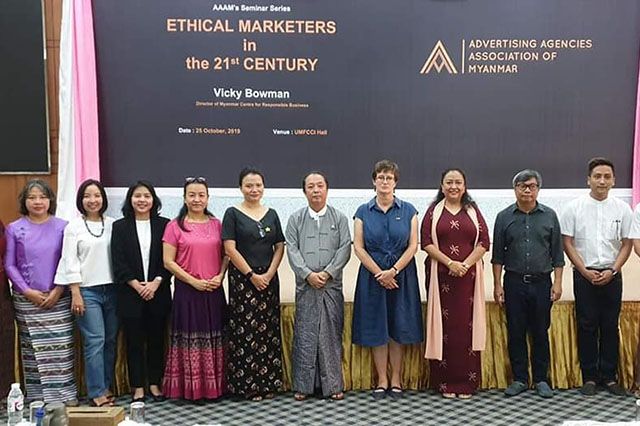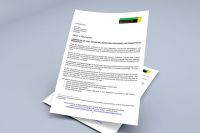Ethical Marketing for the 21st Century in Myanmar

Vicky Bowman spoke on 25 October at a seminar on ‘Ethical marketing for the 21st Century organised by the Advertising Agencies Association of Myanmar - AAAM, at the Union of Myanmar Chambers of Commerce and industry in Yangon.
She welcomed the focus of the AAAM (founded in 2016) on ethical issues, and noted that although MCRB had not focussed on the marketing and advertising sector, a number of the issues and human rights risks raised in MCRB’s ICT Sector Wide Impact Assessment (SWIA) were relevant, such as privacy, children’s rights, and discrimination. So too was MCRB’s wider work on stakeholder engagement and transparency, including the annual Pwint Thit Sa report on corporate disclosure, which high-ranking companies were increasingly including in their branding, and on corruption.
Vicky’s presentation systematically highlighted how these different elements of MCRB’s 10 characteristics of a responsible business does were relevant to marketing and advertising in Myanmar. This began with the need to obey the many laws affecting the industry, and important of business associations undertaking effective and transparent advocacy that regulations were fit for purpose.
She described the trend towards greater company transparency in Myanmar through the 2017 Companies Law and reforms at DICA including the MyCo online companies register. This was in line with an increased interest globally and in Myanmar in due diligence, beneficial ownership, and politically exposed persons (PEPs). Combined with more systems to make public procurement more transparent, and greater awareness of conflict of interests, and clamp downs on gifts to government officials, these might help to address problems such as close relationships between government officials and company staff, and contracts and business opportunities provided to companies set up by their friends or families.
Other problems – again not unique to advertising, or to Myanmar - were the practice of ‘gift-giving’ to staff who have procurement responsibilities to win contracts. For example some advertising agencies seeking business with the Marketing Department will offer gifts and hospitality. Similarly media wanting advertising agencies to place material will offer hidden rebates to the agency to persuade them to place the clients material - advertisers from branded companies in the USA had exposed this behavior by their advertising suppliers in 2015.
Notification 14/2018 issued by the Myanmar Anti-Corruption Commission (ACC) gave guidance to company directors on the need to assess high corruption risks, such staff in positions where they buying services, set a tone from the top, and establish internal whistleblower mechanisms to alert top management to corrupt behavior and conflicts of interest. She noted that the ACC was also working on a draft Whistleblower Law, primarily to address corruption in the public sector, which she hoped would be the subject of public consultation with the private sector and others.
Vicky highlighted a variety of human rights which marketing could impact on, including the rights of children, which MCRB’s and the right to privacy which MCRB had focussed on in its ICT SWIA, the Myanmar Digital Rights Forum, and a briefing paper on data protection. Globally marketing and advertising, even today, was notorious for gender stereotyping, but other risks were negative portrayals of LGBT+ or persons with disabilities. Also a risk was advertising which ‘appropriated’ other cultures for commercial purposes, such as Myanmar ethnic minorities, or insulted Myanmar culture, including Buddhism of which there had been several examples.
She pleaded with companies to drop promotional practices which are harmful to the environment such as balloon launches, which led to tons of discarded latex balloon fragments in the seas, killing turtles who mistook them for jellyfish, as explained in the recent documentary Rubber Jellyfish.
She also highlighted two important new laws – on Competition, and on Consumer Protection - to protect consumers, and other companies from unfair marketing practices, which inter alia included the spreading of false information, noting that marketing had not yet, however, been a subject for the Myanmar Competition Commission although it was regularly in other countries.
Issues raised in discussion included the challenges for advertisers in a slow economy and what role the association could play in Myanmar’s reforms and the importance of internal debate to determine ethical issues. Using global advertising company WPP’s materiality assessment as example, which places ‘ethical standards’ as their most material risk, she encouraged Myanmar advertising and marketing companies to have similar internal and external discussions about ethical challenges and stakeholder risks, noting that many of these were ‘pre-competitive’ and might therefore be addressed through collective action between companies, including dialogue with government on regulatory challenges.
 English
English မြန်မာ
မြန်မာ မြန်မာ (unicode)
မြန်မာ (unicode)










